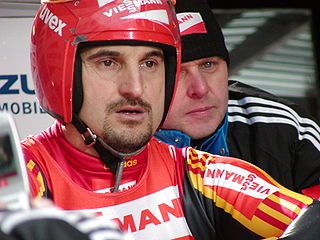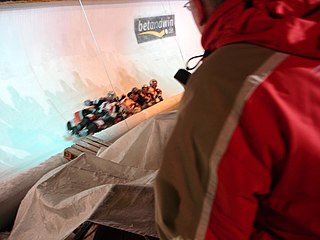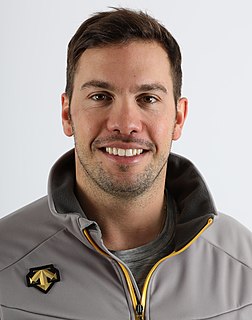
A luge is a small one- or two-person sled on which one sleds supine and feet-first. A luger steers by using the calf muscles to flex the sled's runners or by exerting opposite shoulder pressure to the seat. Racing sleds weigh 21–25 kg (46–55 lb) for singles and 25–30 kg (55–66 lb) for doubles. Luge is also the name of an Olympic sport.

Georg Hackl is a German former luger who was three time Olympic and World Champion. He is known affectionately as Hackl-Schorsch or as the Speeding Weißwurst a reference to what he looks like in his white bodysuit coming down the luge at fast speeds.

Armin Zöggeler OMRI is a retired Italian luger and double Olympic champion. He is one of the most successful men in the sport, nicknamed Il Cannibale, for his notable series of victories, or The Iceblood Champion, for his always cold, rational approach to the races. Fellow luger Tucker West described Zöggeler as the sport's equivalent of Michael Jordan.

Wolfgang Linger is an Austrian retired luger who has competed internationally since 2000. As young children, he and his older brother Andreas learned to luge on a former Olympic luge track, and at age 14 began competing as a doubles team for the first time. Linger has won five medals at the FIL World Luge Championships with three golds and two bronzes. He also earned seven medals at the FIL European Luge Championships with a gold, three silvers, and three bronzes. The Lingers were overall Luge World Cup men's doubles champions in 2011-12 and scored 15 World Cup race victories. In 2005, he broke his leg in a crash, but the next year at the 2006 Winter Olympics in Turin, Italy won the gold medal in doubles luge. He repeated this feat at the 2010 Winter Olympics in Vancouver, Canada, defeating another team of brothers, Andris and Juris Šics of Latvia.
Gerda Weissensteiner OMRI is an Italian luger and bobsleigh pilot who competed from the late 1980s to 2006. Competing in six Winter Olympics, she won the gold medal in the women's singles luge event at the 1994 Winter Olympics in Lillehammer, and together with Jennifer Isacco she won the bronze in Turin in the two-woman bobsleigh at the 2006 Winter Olympics. She was the first Italian sportsperson to win Olympic medals in two disciplines.

Tatjana Hüfner is a German retired luger who has competed since 2003.

Luge is a winter sport featured at the Winter Olympic Games where a competitor or two-person team rides a flat sled while lying supine and feet first. The sport is usually contested on a specially designed ice track that allows gravity to increase the sled's speed. The winner normally completes the route with the fastest overall time. It was first contested at the 1964 Winter Olympics, with both men's and women's events and a doubles event. Doubles is technically considered an open event since 1994, but only men have competed in it. German lugers have dominated the competition, winning 81 medals of 141 possible.

Alexander Resch is a German luger who competed from 1998 to 2010. Together with Patric Leitner, he won the men's doubles event at the 2002 Winter Olympics in Salt Lake City, United States. They also competed at the 2006 Winter Olympics, finishing sixth. At their last race at the 2010 Winter Olympics in Vancouver, they won bronze.

Patric-Fritz Leitner is a German luger who competed from 1998 to 2010. Together with Alexander Resch he won the men's doubles event at the 2002 Winter Olympics in Salt Lake City, United States. They also competed at the 2006 Winter Olympics, finishing sixth. At the 2010 Winter Olympics in Vancouver, they won bronze in their last race.

Stefan Krauße is an East German-German luger who competed from the mid-1980s to 1998. Together with Jan Behrendt he won two Olympic gold medals, one silver medal (1988) and one bronze (1994) in men's doubles.
Wolfgang Staudinger is a West German luger who competed from 1978 to 1989. Together with Thomas Schwab he won the bronze medal in the men's doubles event at the 1988 Winter Olympics in Calgary.

Markus Prock is an Austrian luger who competed between 1983 and 2002. Born in Innsbruck, Prock competed in six Winter Olympics winning three medals in the men's singles event with two silvers and one bronze (2002).

The International Luge Federation is the main international federation for all luge sports. Founded by 13 nations at Davos, Switzerland in 1957, it has members of 53 national luge associations as of 2009 and is based in Berchtesgaden, Germany.
Paul Hildgartner is an Italian luger who competed from the early 1970s to the late 1980s. Competing in five Winter Olympics, he earned two gold medals and one silver medal for his efforts. At the 1984 Winter Olympics, Hildgartner carried the Italian flag during the opening ceremonies.

The Olympic Sliding Centre Innsbruck is a venue for bobsleigh, luge and skeleton located in Igls, Austria. The most recent version of the track was completed in 1975 and is the first permanent, combination artificially refrigerated bobsleigh, luge, and skeleton track, serving as a model for other tracks of its kind worldwide. It hosted the bobsleigh, luge, and skeleton competitions for the 2012 Winter Youth Olympics.

Felix Loch is a German luger and Olympic champion. He has been competing since 1995 and has been on the German national team since 2006. He has won fourteen medals at the FIL World Luge Championships with twelve golds and two silvers. Loch's men's singles win in 2008 made him the youngest world champion ever at 18 years old. He is the youngest Olympic Gold Medalist in men's luge history. As of 2014, Loch is a triple Olympic gold medalist.

Tobias Arlt is a German luger who has competed since 1991, acting as a backdriver. He won a silver medal in the men's doubles event at the 2008 FIL World Luge Championships, a silver and a bronze at the 2010 FIL European Luge Championships, a gold medal at the FIL World Luge Championships 2013, and two gold medals at his debut Olympics, the 2014 Winter Olympics in Sochi.

Tobias Wendl is a German luger who has competed since 1993, acting as a front. He won a silver medal in the men's doubles event at the 2008 FIL World Luge Championships in Oberhof, Germany, a silver and a bronze at the FIL European Luge Championships 2010 in Sigulda, a gold at the FIL World Luge Championships 2013, and two gold medals at his debut Winter Olympics at the 2014 Winter Olympics in Sochi. He is also a Master Sergeant in the German Army.

Tonga sent a delegation to compete at the 2014 Winter Olympics in Sochi, Russia from 7–23 February 2014. This was the Pacific island nation's debut at the Winter Olympic Games. The Tongan delegation consisted of one luge athlete, Bruno Banani, who had changed his name in a marketing gimmick to match that of German brand Bruno Banani. In his event, the men's singles, he came in 32nd place out of 39 competitors.
















